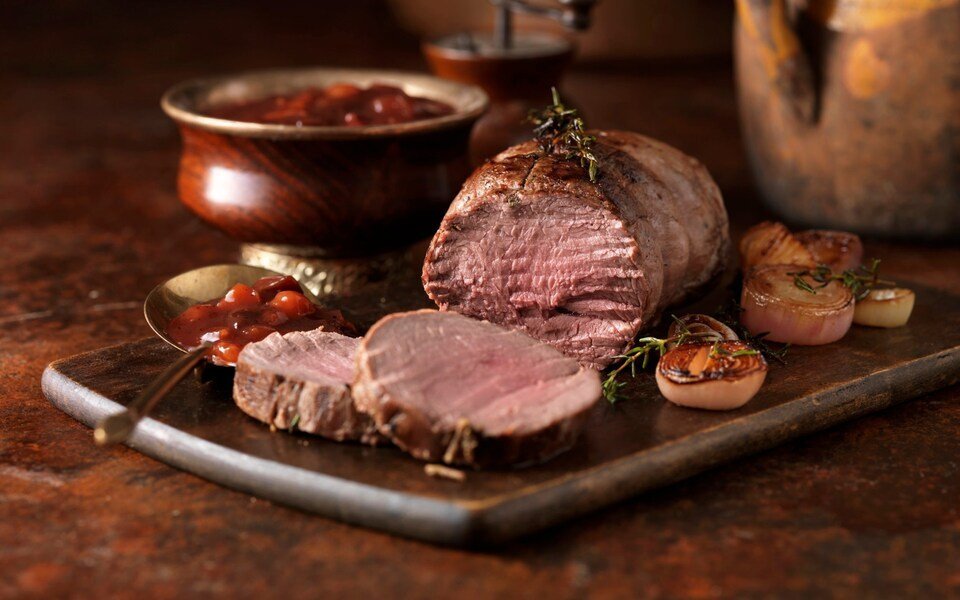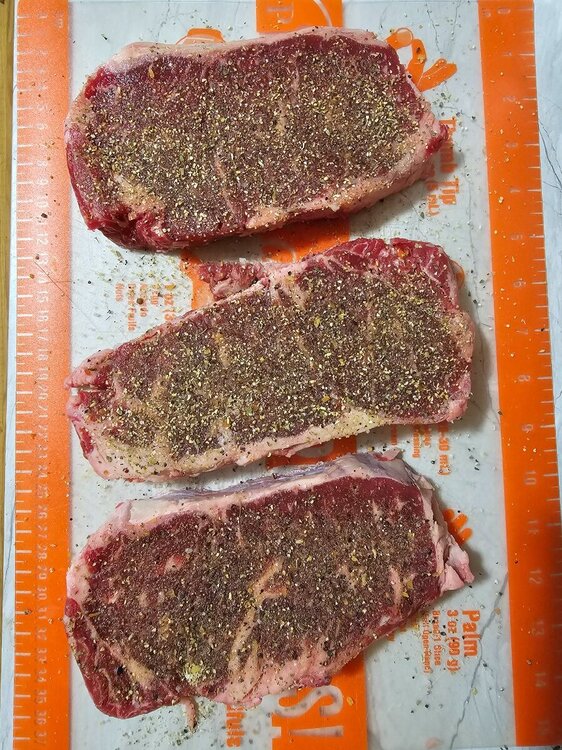Everything posted by Bob
-
British Youths Turn Their Back On Veganism
Appetite for game shoots up among the young as Britain turns its back on veganism Health-conscious younger generation flock to buy meat such as venison after celebrity chefs extoll health and environmental benefits Alex Barton, 25 December 2023 Venison rump with mulled winter fruit sauce and red onions - getting back on the menu for Generation Z CREDIT: Diana Miller/Image Source The appetite for game has shot up among members of Generation Z following a drive to get young people eating meat such as venison or pheasant. The British Association for Shooting and Conservation (BASC) has launched a campaign to encourage more people to eat game, which it says is a cheap, sustainable and mineral rich source of low-fat protein. BASC said its initiatives to get younger people into the previously niche meat have been furthered by celebrity chefs advocating its use. Butchers nationwide are noticing the growth in interest as Britain turns its back on veganism with industry figures showing overall sales of meat alternatives are down 13.6 per cent over the last year. Gareth Dockerty, deputy director of shooting and operations at BASC, said: “Game meat ticks so many boxes for consumers today. It’s healthy, sustainable, can be locally-sourced and is delicious. “It’s a product that has grown in popularity, thanks in part to its versatility, availability, and the enthusiasm shown for it by celebrity chefs. This year alone, we have introduced almost 12,000 people to game meat at shows and events across the UK.” Mr Dockerty added: “We have seen people of all ages keen to try the taste of game – younger people in particular can be quite adventurous but we have found that a simple venison burger or a game pie can be a great universal leveller.” ‘Young people are wanting to try different things’ Pheasant has more protein, less fat, five times as much iron and three times the selenium of chicken, whilst also having a third less calories, according to BASC. Venison results in almost thirty times less carbon emission than beef per kilogram, with roe deer creating 0.6 kilograms of CO2 per kilogram of meat compared with 17.12kg/CO2 per kg of meat for beef. Butchers say venison and other game is a cheap and protein-rich food CREDIT: Images from BarbAnna/Moment RF BASC has led more than 40,000 educational classes during its campaign, with around 2,000 children given the chance to try game each summer as part of its upland outdoor education project. Tim Hanks, who has won Best Butcher in the UK for the last three years, said adventurous, health-conscious young people on a budget are increasingly trying game as an alternative source of protein. Mr Hanks said: “Health-conscious younger people are looking for cheap and protein-packed food.” He said getting elderly people interested is actually more difficult, thanks to the huge cultural impact of Bambi on public consciousness in the 20th century. “Some people, mainly older, have that association with Bambi which deters them from eating game,” Mr Hanks said. “To get them to try something different you need to give them appealing ways to eat it, like pheasant goujons and wild boar sausages.” ‘The market is changing’ The 38-year-old said the hunger for game is “definitely growing” across the country, with airlines such as British Airways adding game terrine to its in-flight menu and hospitals offering it to patients too. He said: “It’s definitely growing, there’s a pattern of people wanting more. It’s nationwide. You have people pushing game and more customers wanting it. That’s all new - the market is changing.” Mr Hanks said he used to sell between one and two carcasses a week in 2018 but now shifts around ten per week. British Airways was contacted for comment. ARTICLE SOURCE: https://www.telegraph.co.uk/news/2023/12/25/game-protein-landfowl-increase-venison/
-
Letter On Corpulence Addressed to the Public by William Banting [Files Library]
It's really neat to find all these keto carnivore diet resources from the 1800's. At the same time, obesity is a modern-day pandemic. We've probably seen that footage of NY city in the 30's and nobody is overweight. Being obese in the 1800's then must have really been tough on someone. You would have really stood out, whereas today it's the norm and nobody seems to care.
-
Hair Thinning
Have you lost a lot of weight in a short period of time? Losing weight on any diet can result in hair loss. The body may see the sudden loss of weight as a sign of famine and will go into survival mode, and your body doesn't consider hair all that important compared to vital organs. We lose and replace hair all the time, and this is only temporary. It will grow back. Alternatively, yet semi-related to the above, are you portion controlling or doing a lot of fasting? Are you eating high fat and skimping on the protein or vice versa? You may need to increase the amount of fat and protein you consume, and vary it up. If you are only eating beef and eggs, throw some salmon in there once in a while. If you can stomach some liver, eat that too (if you like liver, don't go overboard with it). Hair also likes vitamin D, so if you don't get out in the sun a lot, take a small supplement. If you give us an idea of what you eat day in and day out, we can analyze that together.
-
Letter On Corpulence Addressed to the Public by William Banting [Files Library]
View File Letter On Corpulence Addressed to the Public by William Banting In what's billed as the "world's first diet book," William Banting offered his strategy for losing weight. He ate four meals a day, didn't exercise much, drank alcohol, and swore off only a few foods. And, what's more, anyone familiar with current low-carb diets will find similar advice here -- advice given in 1864. William Banting was a carpenter in Victorian London whose weight spiraled out of control. His eyesight and hearing failed, he had weak knees, and he suffered an umbilical rupture, health problems he attributed to his weight. He consulted doctors but nothing helped. Then Banting discovered this diet and got results within just a few days. He ate lots of meat, a few vegetables, shunned some foods that he's previously overindulged in, and drank alcohol with lunch and dinner. He lost fifty pounds, and his health improved. He published this pamphlet detailing his diet and distributed the copies for free. By its third printing it had sold 63,000 copies, and the term "Banting" became synonymous with "dieting" in England. Submitter Bob Submitted 02/21/2024 Category Books
-
Letter On Corpulence Addressed to the Public by William Banting
- 60 downloads
In what's billed as the "world's first diet book," William Banting offered his strategy for losing weight. He ate four meals a day, didn't exercise much, drank alcohol, and swore off only a few foods. And, what's more, anyone familiar with current low-carb diets will find similar advice here -- advice given in 1864. William Banting was a carpenter in Victorian London whose weight spiraled out of control. His eyesight and hearing failed, he had weak knees, and he suffered an umbilical rupture, health problems he attributed to his weight. He consulted doctors but nothing helped. Then Banting discovered this diet and got results within just a few days. He ate lots of meat, a few vegetables, shunned some foods that he's previously overindulged in, and drank alcohol with lunch and dinner. He lost fifty pounds, and his health improved. He published this pamphlet detailing his diet and distributed the copies for free. By its third printing it had sold 63,000 copies, and the term "Banting" became synonymous with "dieting" in England. - What Did You Eat Today?
- Post a picture... Any picture
-
Want to gain weight
The taste is "keto breath", which smells like nail polish remover, and it will go away as your body balances its ketone production. Ketones and their byproducts exit the body through urine, so drink more water to flush the excess ketones out, and maybe brush more often. This is temporary. I can remember mine having a metallic taste. The dry mouth, barring other potential issues like exercise, tobacco, and prescription meds, simply means you need more water and possibly some electrolytes.
-
Want to gain weight
Yes, this is expected. Part of it can be water as well. Since you are not eating carbohydrates you retain less fluid than usual. Most initial weight loss is actually water weight. Based on your past posts, it would seem to me that you are 1.5 weeks in, and therefore still in an transition phase. You have to use up all your carbohydrate stores and become "fat adapted" so that your body starts burning fat/ketones for fuel. If you consume too much protein and too little fat then you end up converting protein to glucose for fuel. You want the body to adapt to using fat for fuel so the protein can be used for building and repairing muscle instead. I would stay the course for now, and try to get at least that 1:1 ratio of fat to protein, or higher.
-
Vinegar Cravings and Legs Cramps on Carnivore
I believe Magnesium Malate is one of the ones you absorb well. I take this product here... https://www.amazon.com/Zentastic-Triple-Magnesium-Relaxation-Absorption/dp/B0BC84FL5C/ref=sr_1_1_sspa? I looked hard for one that did not contain the types of magnesium that isn't very absorbable and are thus notorious for diarrhea. Sounds fine on the surface. Hopefully you are still in your transition phase, but at 6 weeks you should be seeing the end of it soon. I've been doing this since May of last year, and there is a balance to be had. At one time I cut out cheese, skimped on the butter, cut off the fat and gave it to my dog, and I was zero carb, high protein, low fat, and I got diarrhea. But when I started eating the fat, being more generous with my butter, and reintroduced cheese, I got better (I've heard cheese is a natural "constipator"). But the conventional wisdom is to scale it back if you have diarrhea because too much fat will also go right through you if you don't have enough bile in your gall bladder to break it down. Most people are fine at a 1:1 ratio of fat to protein, gram for gram, which ends up being 70% calories from fat and 30% calories from protein. This is easy to achieve with just fatty cuts of beef alone.
-
What Did You Eat Today?
During the summer - on the grille. But during the cold months, I will set the oven to Broil - High. I will also turn a stovetop burner on High and get it heating up with some butter, tallow, or ghee in the pan. I will salt and season both sides and place it in the pan in the hot melted fat and sear one side for 4 minutes. Then I will flip it over and place the whole pan on the top rack of the oven and let it Broil for another 6 minutes. This usually comes out medium, or slightly medium rare if the steak is a thick one. If you like it more done, add a minute to the Broiler step.
-
Vinegar Cravings and Legs Cramps on Carnivore
It could be that you simply love the taste, and after several weeks of just meat and salt you're taste buds are delighted to have something different, and zesty nonetheless. However, since the timing of these cravings is paired with the sudden onset of leg cramps, I would lean towards mineral and electrolyte deficiency. I struggle with leg cramps too because I have Chronic Kidney Disease - I spill magnesium like crazy and the diet is low in magnesium to begin with, unless you can hork down 3-4 pounds of red meat a day, which I cannot. Therefore, I have to supplement. If the craving is for mustard, then you might be low in Calcium, Thiamine, Manganese, Selenium, or Potassium. If the craving is for vinegar, the deficiency might be in Calcium, Magnesium, Phosphorus, Potassium, or Iron (not likely on carnivore). Most of these you can check with a blood test. Ironically, an at-home remedy for leg cramps is to drink pickle juice for fast relief - which points us towards vinegar also. How much LMNT per day? A single packet contains 200mg of potassium and 60mg of magnesium. That's not a lot in the way of supplementation if you are only drinking one a day. If you bumped that up to 5 packets a day, I would hope you would notice a difference, as that would give you 1000mg potassium and 300mg of magnesium a day. Do note that there is plenty of potassium in meat, especially chicken and pork (both sausage and bacon). Usually, magnesium is the issue and not potassium. By way of comparison, I take a magnesium supplement in pill form that is 80mg per pill. I was taking 5 a day (400mg), one with my first meal, one with my second meal, and three at bedtime. I recently tested my magnesium, and it was a bit too high (kidneys, remember) so I backed it down to 3 a day (240mg) - one with each meal and one a bedtime. After 3 weeks, I am starting to have little twitches and cramps again, so I think 4 pills (320mg) is going to be the sweet spot. Depends on how much fat you are taking in each day. Do you track your macros? Keto Chow Daily Minerals is a great product that would probably help you more than LMNT.... https://www.ketochow.xyz/products/daily-minerals Be warned the liquid form tastes terrible, and you should divide the serving up into 3 smaller servings and dilute it in another beverage a few times per day. If you try and take it like a shot of whiskey you will want a whiskey to get rid of the taste, lol. They also have a pill form they just came out with. At the same time, you can enjoy your mustard, your vinegar, and your pickles. These are all harmless. Hope this helps!
-
Thoughts Coconut & C8 MCT Oil ?
Excellent advice above. In general, coconut oil, MCT oil, olive oil, and avocado oil are all okay as they are not seed oils. However I olive oil and avocado oil can't handle high heat so I wouldn't use them for cooking - but rather as a dressing. Another potential problem with olive oil is that a lot of "olive oil" is cut with soybean oil, so you have to be careful. Coconut oil, from what I understand, has a very high smoke point and therefore is better to cook with... IF you like the taste of coconut, lol.
-
Beef shortage
Hey Donna 🙂 I haven't heard about an impending beef shortage. Where did you get this information? Do you mean half a cow? I want to get a half cow also, but I will need to buy a chest freezer. My old one died years ago (and I lost a ton of food as a result). I can get "sides of beef" or quarters locally for a fantastic price.... https://www.dumameats.com/meat-market/sides-of-beef/
- What Did You Eat Today?
- Post a picture... Any picture
-
Cuts of meat for Strick Carnivore and eating fat
New York Strip and Ribeyes are some nice fatty cuts of meat. If you cook them in a pan instead of a grill you can collect the fat, pour it on top or use it for dipping sauce. People who love to grill their meat will often put a pad of butter on it to melt to make up for the lost fat. Also, ground beed that is 80/20 or better yet 70/30 is a great way to get in some fat. And don't forget bacon. But for leaner cuts, you will want to use butter, ghee, tallow, or find a recipe for a carnivore friendly sauce to use for dipping. You do hit 70% with that 1:1 ratio. At 4 calories per gram of protein and 9 calories per gram of fat, you get 30% calories from protein and 70% calories from fat. The way to get more fat is through butter, heavy cream, tallow, etc. If you don't overeat you should be fine. Some stall when they include dairy, such as cheese. I was stalled since mid-November, but I also was intentional about stopping my weight loss. This week, I've been trying to be mostly Lion Diet (beef only) and 2 meals a day, and I've dropped 2 pounds so far.
-
New from georgia
Welcome aboard @atlsrt44 🙂 Ignore the naysayers. You are getting results and that is what matters. And yes, it's mind-boggling how sugar and seed oils are snuck into anything and everything, even in products that you wouldn't think it would be in, and for the life of me can't understand why it's in there. In general, you don't need to supplement if you are eating a proper human diet (keto, ketovore, carnivore). But if you don't get a lot of sun, then some vitamin D might be in order (you will want to test this periodically). Magnesium is hard to get enough of unless you eat like 3 pounds or more of meat a day, so many carnivores will drink LMNT or some other electrolytes, or take a magnesium supplement. You'll know if you need some yourself if you start having muscle twitches and leg cramps (we used to get magnesium in our water, but it's filtered out these days). Your multivitamin might just cover all the bases. I would have to see a link to the nutrition facts.
- What Did You Eat Today?
-
Want to gain weight
Welcome Carlo! Yes. You can gain muscle (but you will lose fat) on a carnivore diet in conjunction with lifting heavy things and working out. You can look to the examples of Dr Shawn Baker and Dr Anthony Chaffee. They both are strict carnivores and are built like a tank. However each of them probably consume 3 lb of fatty red meat each day. Logic would dictate that the more you work out, the more hungry you will be, and the more food you will eat.
-
Not enough fat from meat
If you are looking up your ribeye nutritional facts online, you are going to get a ton of different results, many of them being for short ends, trimmed of all the fat, and very lean. But if you get a normal ribeye steak and eat all the fat with it you're going to be fine. Check out this link... https://www.nutritionix.com/i/usda-choice/ribeye-steak/63a2e860e3a14b00086f427e According to that, for a 4 oz piece of steak, which is pretty small, 300 out of the 370 calories come from fat. Don't forget to include the butter, ghee, or tallow that you cooked it in. You can also pour that butter, ghee, or tallow leftover in the pan from cooking into a small dish and use it as dipping sauce. You can also choose to melt a couple pads of butter over top of your steak. All of this will be pure fat. This is something I do regularly. If you make scrambled eggs in butter, the eggs absorb all that butter. If you eat ground beef, get either 70/30 or 80/20 and try to resist draining the fat after cooking (this can be difficult with the 70/30 because there's a lot of it). And then there are other carnivores who do quite well without overthinking the fat.
-
Fell off the wagon...
I can't do grains, so cookies are out for me. The 2 times I have tried just a bite of bread/sugar I was suddenly jonesing for more. It was like crack cocaine. I find this to be the case for me too. I can be at a stall for weeks. Then, I'll "cheat" with a large apple, lol, and that will get things moving again. Although I don't consider an apple to be truly cheating. I'm currently mostly carnivore, but I am not averse to certain select fruits and certain select vegetables.
-
Vegan to new carnivore - but I don't like meat
Welcome Robert. I like the name 😄 This could be either a case of under-eating, or you might be experiencing the keto flu. Salmon is a good fatty fish and eggs are fantastic. But remember that fat is your new energy source in lieu of carbs so make sure you are getting enough fat. You can do this with plenty of butter, cheese, etc. You can also make homemade mayonnaise and sauces that are rich in fats too. Yes. Keep having it, even if in small portions. The human pallet can be trained. Many of us had to acquire a taste for certain foods, whether it was veggies when we were kids, beer when we became adults, etc. You can also acquire the taste for red meat. Don't be afraid of salt and seasonings either to make it more palatable.
-
What Did You Eat Today?
It's a Dash Tasti-Crisp Air Fyer that we got from Bed Bath & Beyond years ago when they were going out of business. It's a primitive model with no temperature settings and a wind-up timer (I looked it up, it's 400 degrees). You can still get them at Kohl's or Amazon. It's a cheap, entry level air fryer but it gets the job done. I do want to get a larger one some day.
-
Food for thought about Statins.
So this was actually fascinating! The history of how these drugs came to be throughout the decades, including the studies and the examples of drugs that had to be pulled from the market AFTER causing people harm was interesting to listen to.





